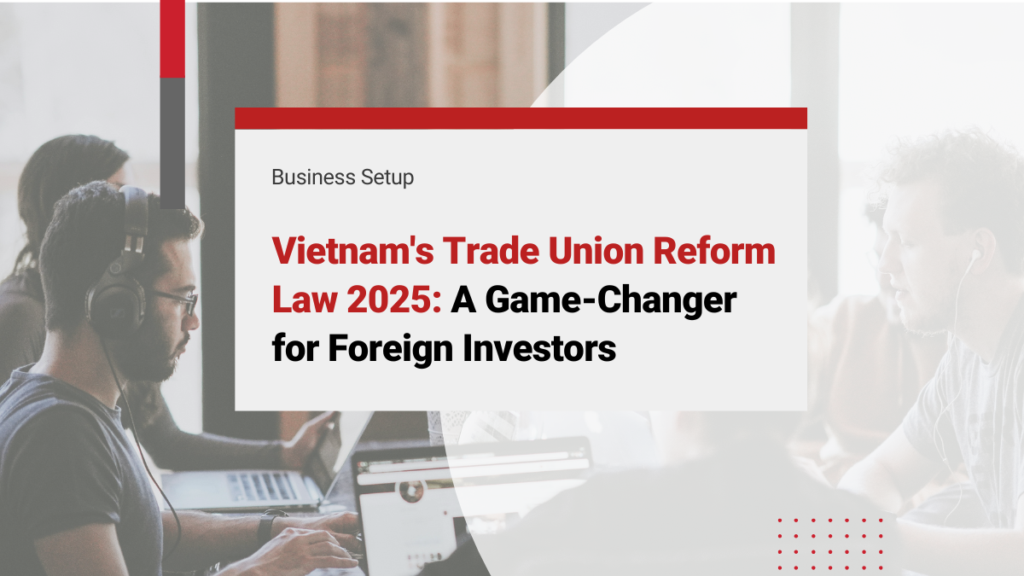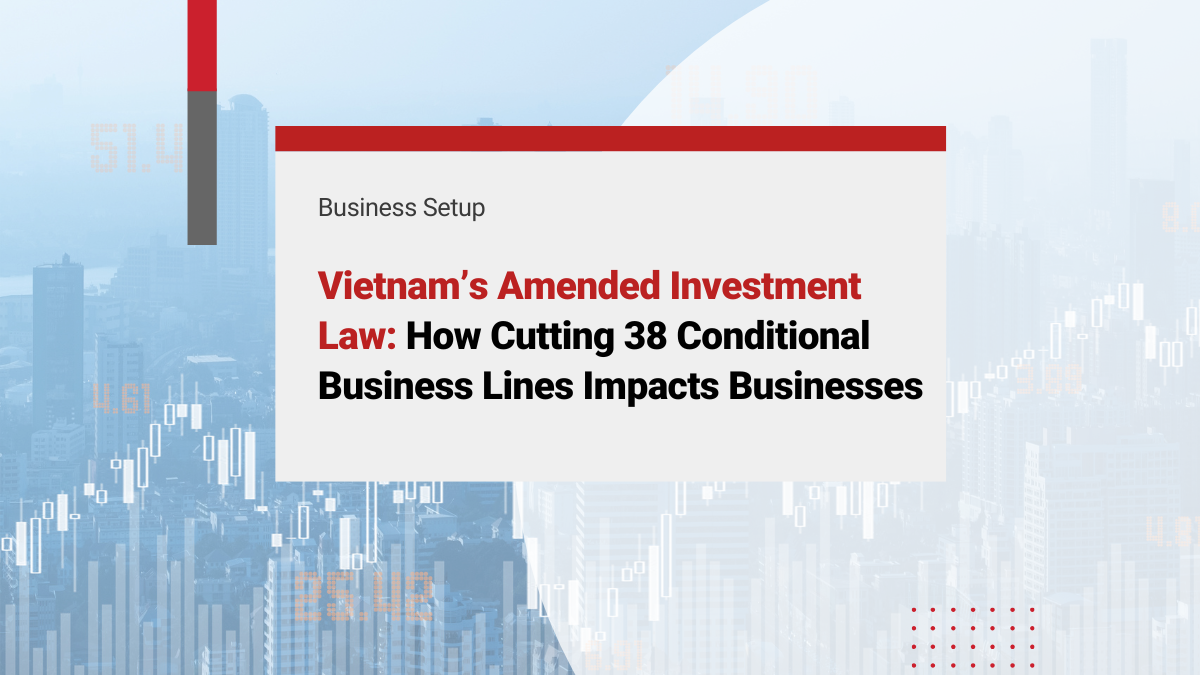Vietnam’s business landscape is undergoing a significant transformation with the introduction of the Trade Union Reform Law 2025, which officially took effect on July 1, 2025. This landmark legislation represents a major shift in Vietnam’s labor relations framework, offering new opportunities and considerations for foreign investors looking to establish or expand their operations in one of Southeast Asia’s most dynamic economies.
Key Provisions of the Trade Union Reform Law 2025
Foreign Employees Inclusion in Trade Unions
The most groundbreaking change in Vietnam’s Trade Union Reform Law 2025 is the inclusion of foreign employees in the country’s trade union system. For the first time in Vietnam’s history, foreign employees working under employment contracts of 12 months or more are now eligible to join and participate in trade union activities at the grassroots level. This provision demonstrates Vietnam’s commitment to creating an inclusive and equitable labor environment that aligns with international standards.
The law specifically allows foreign nationals to:
- Join grassroots trade unions in their workplaces
- Participate in trade union activities and meetings
- Access union benefits and protection services
- Contribute to workplace discussions and decision-making processes
However, foreign employees cannot hold leadership positions or become trade union representatives, as these roles remain reserved for Vietnamese citizens.

Enhanced Employee Rights and Protections
The Trade Union Reform Law 2025 significantly strengthens employee rights by expanding the definition of eligible employees. Vietnamese employees without formal labor relations, including freelancers and self-employed individuals, now have the right to establish, join, and participate in trade unions. This expansion reflects Vietnam’s adaptation to the changing nature of work and the growing gig economy.
Key employee protections include:
- Comprehensive anti-discrimination measures: The law explicitly prohibits discrimination against employees based on their trade union participation.
- Enhanced workplace representation: Trade unions gain additional powers for social supervision and criticism.
- Improved financial transparency: Stricter mechanisms for monitoring trade union finances ensure accountability.
- Protection against retaliation: Employers are prohibited from taking adverse actions against employees who join or participate in trade unions.
Financial Framework and Compliance Requirements
The law maintains the existing 2% trade union fee contribution rate based on the salary fund used for compulsory social insurance calculations. However, it introduces new provisions for exemptions, reductions, and temporary suspensions of these fees under specific circumstances:
- Exemptions: Enterprises facing dissolution or bankruptcy.
- Reductions: Companies experiencing financial difficulties due to economic reasons or force majeure events.
- Temporary suspensions: Organizations unable to pay due to production halts, with suspension periods up to 12 months.
After any suspension period, companies must make supplementary payments for the suspended period, with the deadline set as the last day of the month following the suspension period’s end.
Read More: How Companies can File a Financial Statement in Vietnam?
Impact on Foreign Investment and Business Operations
Manufacturing Sector Dominance
Vietnam’s appeal to foreign investors remains strong, particularly in the manufacturing sector. In the first half of 2025, the country attracted $21.52 billion in registered FDI capital, representing a remarkable 32.6% increase compared to the same period in 2024. Manufacturing and processing sectors dominated with nearly $12 billion in investment, accounting for 56.6% of total FDI inflows.
The manufacturing sector’s continued dominance reflects several factors:
- Competitive labor costs: Vietnam offers cost advantages compared to other regional manufacturing hubs
- Strategic location: Proximity to major Asian markets and established supply chains
- Government support: Proactive policies and incentives for foreign manufacturers
- Infrastructure development: Ongoing improvements in transportation and logistics networks
Read More: How Vietnam’s Labor Law Affects Foreign Businesses: Labor Code, Contracts, and Regulations?
Foreign Investment Trends and Statistics
Vietnam’s FDI performance in 2025 demonstrates the country’s resilience and attractiveness as an investment destination. The $11.72 billion in disbursed FDI for the first half of 2025 represents an 8.1% year-on-year increase and marks the highest realized foreign direct investment for a six-month period in five years.
Leading sources of foreign investment include:
- Singapore: $4.6 billion (21.4% of total)
- South Korea: Over $3 billion (14.3% of total)
- China: $2.55 billion
- Sweden: $1 billion (emerging as third-largest source of new projects)
- Japan: $832.3 million
Compliance Requirements for Foreign Businesses
The Trade Union Reform Law 2025 introduces several compliance requirements that foreign investors must navigate:
Mandatory trade union establishment: All enterprises must establish trade unions or facilitate employee participation in existing union structures. Companies employing foreign employees with contracts of 12 months or more must inform these employees of their right to join trade unions.
Financial compliance: Businesses must ensure timely payment of the 2% trade union contribution rate and maintain transparent financial records related to union activities. The law establishes stricter penalties for non-compliance, including fines for delayed payments or incorrect reporting.
Enhanced oversight: Trade unions gain expanded rights to request documents from businesses and participate in audits related to employee rights and benefits. This increased oversight requires companies to maintain comprehensive documentation of their labor practices.
Health insurance integration: Complementing the trade union reforms, foreign employees working under fixed-term contracts of 12 months or more must now participate in Vietnam’s health insurance system, creating additional compliance obligations for employers.
Read More: Vietnam Investment Law: Quality Investors Need to Know
Strategic Implications for Foreign Investors
Opportunities in Priority Sectors
The Trade Union Reform Law 2025 aligns with Vietnam’s broader economic development strategy, which emphasizes high-tech manufacturing, semiconductors, and artificial intelligence. Foreign investors in these sectors can benefit from:
- Skilled workforce development: Enhanced trade union participation contributes to better training and skill development programs
- Improved labor relations: Structured dialogue between management and employees through trade unions can reduce workplace conflicts
- Regulatory alignment: Compliance with international labor standards enhances Vietnam’s appeal as a manufacturing hub for global brands
Risk Mitigation Strategies
Foreign investors should implement comprehensive strategies to navigate the new regulatory environment:
- Proactive compliance: Establish robust systems for trade union fee collection and reporting. Implement clear policies regarding foreign employee rights and union participation.
- Stakeholder engagement: Develop constructive relationships with trade union representatives and participate actively in collective bargaining processes. This approach can help prevent labor disputes and create a more stable operating environment.
- Documentation and transparency: Maintain detailed records of labor practices, wage payments, and union-related activities. The enhanced oversight provisions require companies to be prepared for increased scrutiny.
- Integration with business strategy: Consider trade union participation as part of broader corporate social responsibility initiatives. Companies that embrace these changes can differentiate themselves as responsible employers in Vietnam’s competitive market.
Economic Context and Market Outlook
Robust Economic Performance
Vietnam’s economy posted impressive 7.52% growth in the first half of 2025, representing the fastest first-half pace in 15 years. This strong performance provides a favorable backdrop for foreign investment, with key sectors showing positive momentum:
- Services sector: 8.14% growth, contributing significantly to GDP expansion
- Industrial production and construction: 8.33% combined growth
- Agriculture, forestry, and fisheries: 3.84% growth, providing economic stability
Investment Climate Improvements
The trade union reform law 2025 represents part of Vietnam’s broader effort to modernize its legal framework and align with international standards. Recent policy initiatives include:
- Streamlined investment procedures: New special investment procedures can reduce approval times by up to 75%.
- Enhanced investor protections: Stronger guarantees for profit repatriation and asset protection.
- Infrastructure development: Continued investment in transportation and logistics networks.
- Digital transformation: Improved online systems for business registration and compliance.
Regional Competitiveness
Vietnam’s reforms come at a time when the country is positioning itself as a preferred alternative to China for manufacturing operations. The trade union reform law 2025 enhances this positioning by:
- Demonstrating commitment to labor standards: Alignment with international best practices.
- Creating predictable business environment: Clear regulations reduce uncertainty for foreign investors.
- Fostering innovation: Improved labor relations can contribute to productivity growth and innovation.
How InCorp Vietnam Can Help?
Vietnam’s Trade Union Reform Law 2025 marks a major step toward transparent and inclusive labor practices, aligning with global standards. Foreign investors who adapt quickly and ensure regulatory compliance will be well-positioned for long-term success in the Vietnamese market.
Navigating Vietnam’s evolving labor laws and compliance requirements can be overwhelming, especially for foreign companies aiming for seamless market entry and ongoing operations. InCorp Vietnam offers expert guidance, ensuring your business stays compliant with every new policy and regulation, so you can focus on growth while we handle the complexities. Trust our local expertise to simplify your expansion and safeguard your investments in Vietnam’s dynamic business environment.






